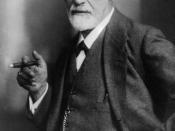The behaviour of the protagonist in Shakespeare's play Hamlet (Shakespeare 1984) is complex and somewhat mysterious. In an attempt to understand the motives behind his unusual conduct, Critics have investigated the possibility of Hamlet's actions being prompted by his Oedipal complex. This concept, constructed by psychoanalyst Sigmund Freud, suggests that Hamlet has subconscious sexual desires for his mother, and therefore longs to see his father's destruction as he is , in his eyes, the only obstacle that hinders his wishes from becoming reality. This interpretation of Hamlet's character has undergone much popularisation since Freud first proposed the option, but not without much debate over the controversial suggestion that Hamlet is little but a subject to his unconscious desires. With reference to Shakespeare's written version of the play, I will investigate the feasibility of the psychoanalytical explanation further, giving both support for the view, aswell as alternative rationalizations for Hamlet's behaviour.
Finally, I will infer whether I believe this approach enriches our understanding of the play or not.
Hamlet's temperament has been interpreted in such numerous and diverse ways, that it is difficult for a spectator to know what Shakespeare's meaning behind the protagonist's behaviour really was.
Film-makers, in particular, have utilised their creative rights, to paint their own pictures of Hamlet to the public (Scherzinger 2006). Such is the case with the overemphasis of strong sexual undercurrents that have been expressed by film-makers in reenactments of the play. Is this really a grounded interpratation of Hamlet? Most will answer with no- to leap to the absurd conclusion that Hamlet desires sexual relations with his mother is simply bizarre. Nothing, it seems, is said or done by Hamlet, that could not be explained away by his resentment towards his mother and uncle. Yet scholars of Freud will argue that just...


